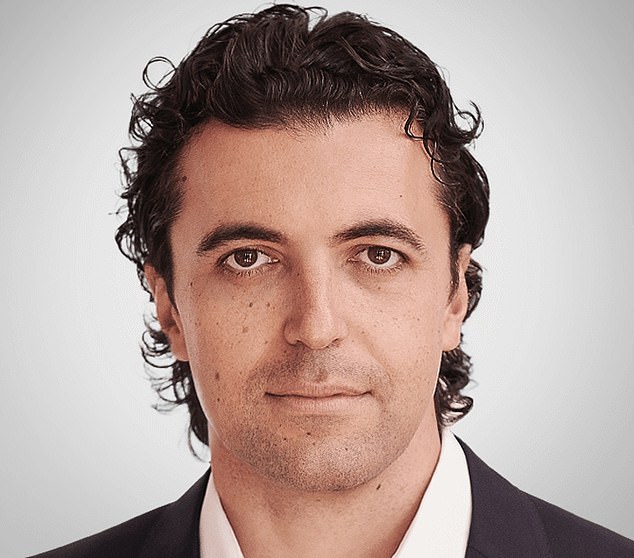By any measure, Trading 212 is one of the biggest savings and investment platforms in the UK – but you wouldn’t know it.
It has just surpassed 4.5 million customers – more than established rivals Hargreaves Lansdown, AJ Bell, Interactive Investor and Vanguard combined.
Every day it signs up more customers than any of them – with accounts that can be opened with as little as £1 and its offer of commission-free trading (Hargreaves Lansdown, by comparison, charges up to £11.95 to buy and sell shares).
Only a year after it launched its cash Isa, it is already the biggest cash Isa service in the UK, with 765,000 of the tax-free accounts now open on the platform.
That’s no doubt due to its top easy-access cash Isa rate, which is regularly the most generous on the market (it currently offers 4.1 per cent).
And Trading 212 has just passed a major milestone – it now has a hefty £25 billion in assets under administration.

Investment drive: Trading 212 co-founder Ivan Ashminov, 45, believes curbing the cash Isa limit would be a mistake and would like to see stamp duty removed from UK shares
But despite its meteoric growth, Trading 212 is still not taken seriously by many. Sceptics question how it makes money and are unclear about the company’s origins. Trading 212 is UK-based but founded in Bulgaria with offices in Cyprus, Germany and Australia.
While other investment firms lobby and are courted by the Government, network, write open letters to the regulator, have billboards and are regularly the source of interviews and briefings, Trading 212 has been noticeably quiet, which has made some would-be investors nervous.
Today, Trading 212 co-founder Ivan Ashminov, 45, gives his first media interview for years – and lifts the lid on the company’s plans to democratise investing further.
‘You are the first media person I’m speaking to and that we as a company are opening up to since the early days when we decided to introduce zero-commission investing,’ says Ivan, speaking from his unassuming office a stone’s throw from the Bank of England.
‘When we launched zero-commission investing in 2017 and said we are going on a mission to democratise investing, I don’t think anybody was particularly interested in the company, so maybe they didn’t take us very seriously.
‘We decided, let’s focus 100 per cent of our energy on just the product – build, deliver.’
And that’s what Trading 212 has done: grown while staying lean (it still has just 130 employees in the UK), and kept up a conversation with its customers.
But in the last few months, things have changed. The Government has become increasingly vocal about its ambition to get more people in the UK investing – an area in which Trading 212 believes it has the expertise to contribute.
Cutting the cash Isa allowance would be a mistake
Take, for example, a limit on the cash Isa allowance. On Monday, once again Chancellor Rachel Reeves raised fears that the limit could be cut from a maximum of £20,000 per tax year when she said money is put into cash Isas that could make a better return if invested in the stock market.
Ivan believes curbing the cash Isa limit would be a mistake. ‘Cash is an essential tool for some people,’ he says.
‘If the limit is reduced, the backlash will be tremendous. These people are not going to move to stocks overnight. They will just move to other savings accounts and receive less money.’
If the cash Isa limit is reduced, the backlash will be tremendous
If the aim is to get more people investing, there are plenty of better options. One is making investing sound less scary.
‘If you look at investing adverts, the risk warnings read like we’re selling a medical product,’ says Ivan. ‘Kids can buy the most sugary product that is clearly not good for your health with no warning, and yet look what we have to say just to promote a vanilla investment product.’
He adds that removing stamp duty on UK shares would help. But despite his experience, Ivan is still not being invited to share it.
‘Unfortunately, nobody invites us to the table,’ he says. ‘It’s a bit like not inviting Amazon in the early days, when you want to have discussion about e-commerce. Maybe it’s because we don’t promote ourselves as a company.’

Platform: Trading 212 It has just surpassed 4.5 million customers – more than established rivals Hargreaves Lansdown, AJ Bell, Interactive Investor and Vanguard combined
Maybe it’s also the way the company has grown – from scratch and with little fanfare – that has created wariness among some.
Ivan and his co-founder Borislav Nedialkov started the company in 2004 in their hometown of Sofia, Bulgaria, with just a few hundred pounds earned from coding for other companies.
‘I was 21 and then, you had to make your own future, otherwise there’s nothing,’ says Ivan.
‘I didn’t have my own room – I shared with my older sister – so I had to do something with my life. I thought, what can I do? I can write code, because I’ve been a computer geek since 13 years old.’
Ivan bought the domain name Trading 212 for £10 and for months worked seven days a week coding to create the first version of the investing platform.
‘I knew I wanted “trading” in the name, but all of the other key words had been taken, so I thought I’d add a number, which went against the grain at the time,’ he says.
He chose ‘212’ because it was the dialling code for New York where all the big banks were – and at the time he was wearing the Carolina Herrera aftershave called 212.
Perhaps another reason that Trading 212 has been treated with caution is that it makes money from offering Contracts For Difference (CFDs) which are high-risk financial products that allow traders to speculate on price movements of assets without owning them.
He says: ‘This was probably the major source of scepticism for everyone at the beginning because they were too focused on our origins in CFDs.
But we don’t advertise them except for very targeted search terms and we have created this Chinese wall around the accounts so CFDs are a separate account.’
Critics have questioned 212’s commitment to best outcomes for investors when it offers instruments such as CFDs that more often than not lead to losses.
Ivan says: ‘CFDs allowed us to build this, right – obviously, since we didn’t take external funding. It allowed us to start this journey. In terms of percentage of our revenue, they’re becoming a smaller part of it – still significant.’
So what’s next? Firstly, Trading 212 is launching a Self-Invested Personal Pension (SIPP). This, too, will be commission-free.
But perhaps the biggest transformation will come from its use of AI. Trading 212 is working on tools that will allow you to analyse your portfolio in a way that until now has been accessible only to the likes of hedge fund traders.
Plus, Ivan sees a time when AI will be able to help investors with their financial planning. ‘You will have a tool that will know your financial circumstances and goals better than anyone else, and it will provide you a context to make your own decisions better than any human advisor.’
Beyond this, Ivan is also planning to add actively-managed funds for its new Sipp investors – and is considering bringing financial advisers in to its chat forums. Now it has broken cover, will Trading 212 finally be invited to the table?
DIY INVESTING PLATFORMS

AJ Bell

AJ Bell
Easy investing and ready-made portfolios

Hargreaves Lansdown

Hargreaves Lansdown
Free fund dealing and investment ideas

interactive investor

interactive investor
Flat-fee investing from £4.99 per month

InvestEngine

InvestEngine
Account and trading fee-free ETF investing

Trading 212

Trading 212
Free share dealing and no account fee
Affiliate links: If you take out a product This is Money may earn a commission. These deals are chosen by our editorial team, as we think they are worth highlighting. This does not affect our editorial independence.












